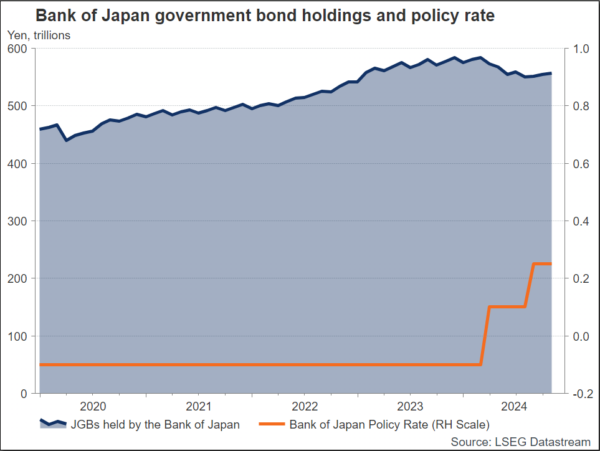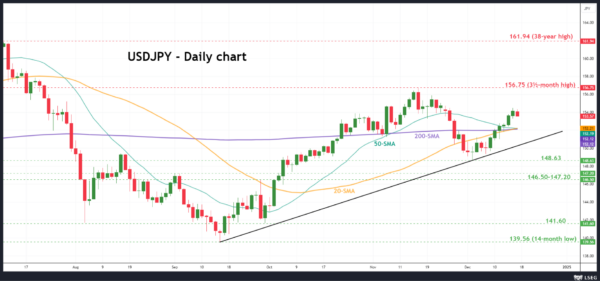- BoJ may leave rates unchanged in December’s meeting
- Next rate hike may not come until March
- Policy decision is due on Thursday at 03:00 GMT
- Yen weakness continues
Market consensus overwhelmingly for steady rates
The Bank of Japan (BOJ) is anticipated to keep its interest rate steady at 0.25% during its upcoming two-day meeting on December 18-19, the last one for 2024. This decision aligns with the central bank’s cautious approach as it seeks more clarity on domestic wage and spending trends, as well as potential policy changes from the incoming US administration under President-elect Donald Trump.
Low rates and yen weakness
Japan’s interest rates remain the lowest among developed nations due to the BoJ’s long-standing policy to support the country’s sluggish economy. Economists see wage growth propelling Japan’s economy towards the BoJ’s 2% inflation target. However, they suggest the BoJ might wait another month to assess wage-driven inflation dynamics, focusing on the positive momentum from next year’s spring wage negotiations and the possible impact from Trump’s trade policies.
Timing of rate hikes in question
The BoJ ended its negative interest rate policy in March and raised its short-term policy target to 0.25% in July. It has signaled its readiness to hike again if wages and prices move as projected and strengthen the conviction that Japan will durably hit 2% inflation. However, the central bank has been cautious about the timing of the next rate hike, leading to fluctuations in market expectations between November and December. Traders are almost entirely anticipating a quarter-point increase by March, as Governor Ueda and his colleagues have reiterated that they are ready to raise rates again in response to a strengthening economy, increasing earnings, and inflation exceeding the target.
Currency risks: Yen’s influence on BoJ decisions
Currency risks also play a significant role in the BoJ’s decision-making process. Analysts pointed out that the yen’s value against the dollar could influence the central bank’s actions. A stronger US dollar could weigh on the yen and accelerate the BoJ’s policy normalization, while a weaker yen supports Japan’s reflation efforts.
Currently, dollar/yen is easing after six consecutive green days but is standing above the 200-day simple moving average (SMA) at 152.10, which is acting as a strong support level. Any upside pressure may send the market to the three-and-a-half-month high of 156.75. However, a descending move below the 151.10 support and the short-term uptrend line may increase the chances for a bearish retracement.















